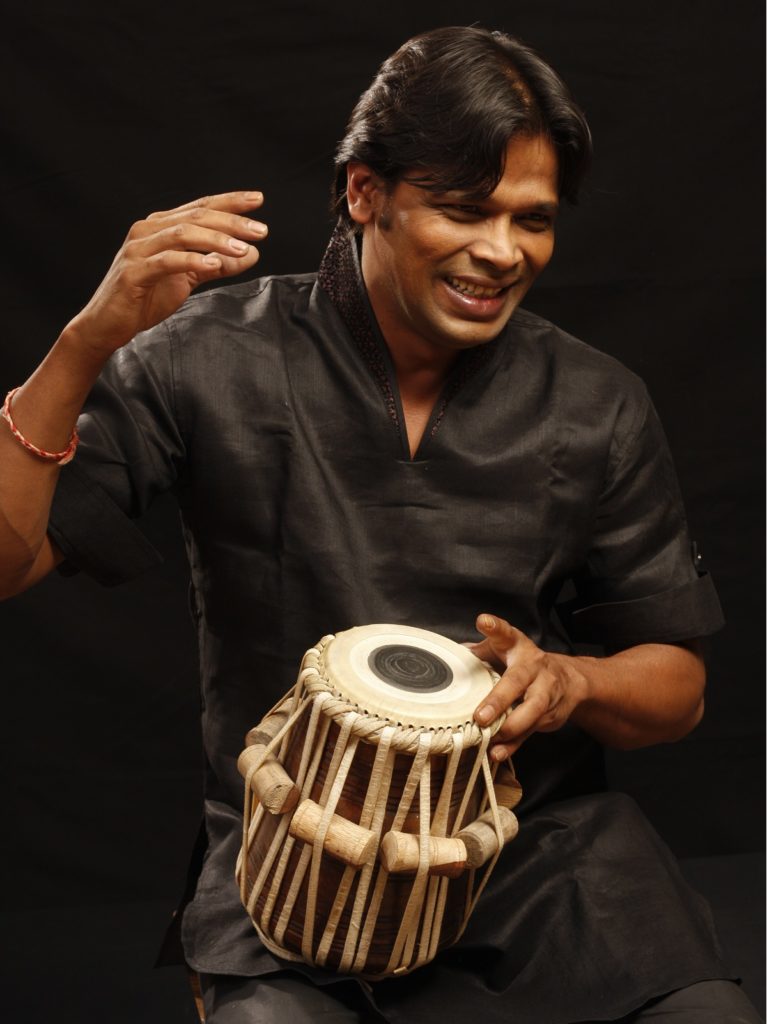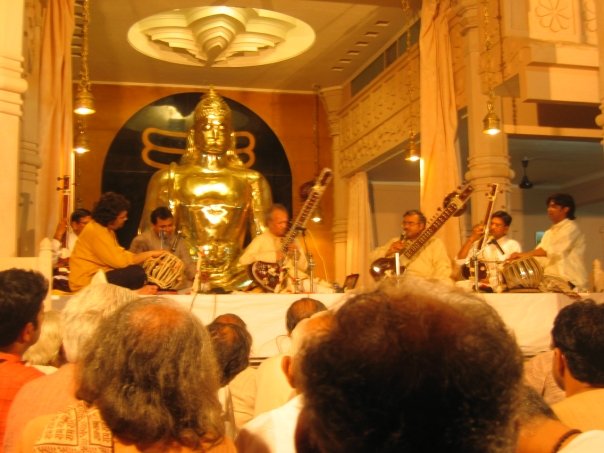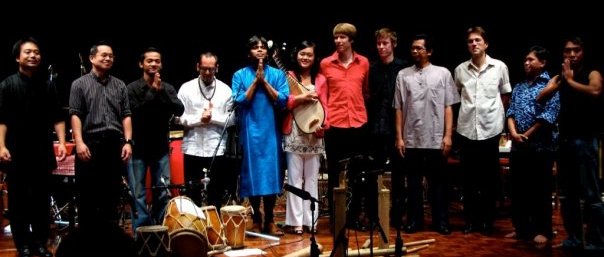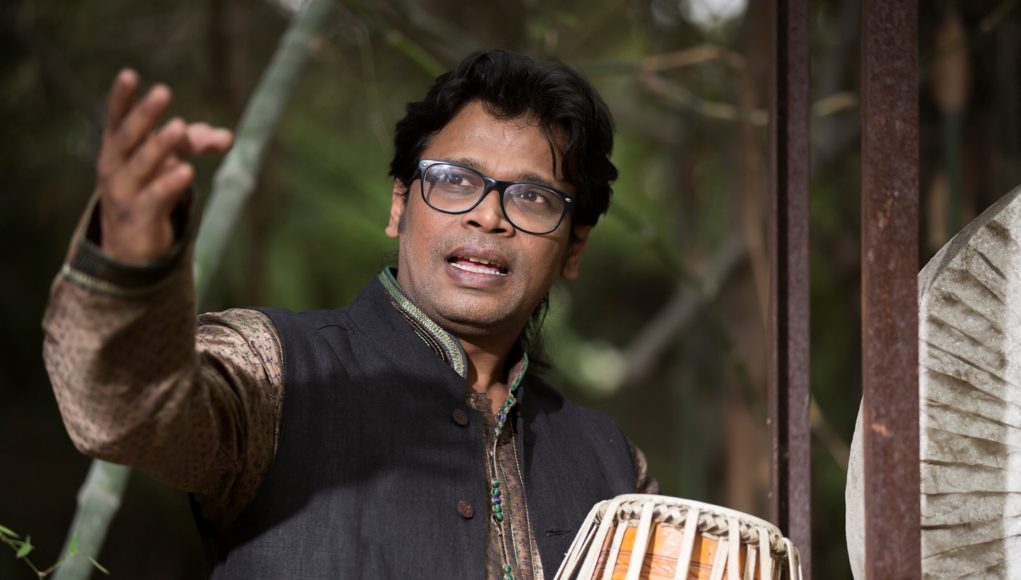He was born in a family full of musicians, he led musicians from around the world on many occasions, he was fortunate enough to live with Pandit Ravi Shankar Ji and learnt music from him, he is a Bengali with his heart beats for India. He is none other than Udhai Mazumdar, an Indian Tabla player, music producer and composer, settled in Switzerland.
His father, Partho Sarathy Mazumdar, is among the first generation of guitarists in Indian classical music. Udhai is married to Filomena Bianculli. Together, they have one son, Jay Mazumdar and one daughter, Isha Mazumdar. Udhai Mazumdar composes music and teaches students in Basel, Switzerland and New Delhi, India.

He has spoken to me for an exclusive interview for Bong Haat Binodon audience.
Excerpts:
Q: You hail from a family of musicians and were brought up with the tunes of music, Tabla specifically. How has the journey been for you?
Ans: – My life in India, especially as a child in Allahabad was positive for the most part. I had a loving relationship with my parents who gave me proper education whether in academic line or in music that strengthened my identity; I was a science student that quenched my basic curiosity in nature, while my father gave me proper guidance in vocal music nurturing musical interest. In those days only the Zamindars were Patrons of Music. At that time in a decent society, music was a taboo – it was considered immoral to learn or listen to music, yet my family disobeyed such norms and let me explore music with proper training.
I learnt Hindustani Classical vocal music and also Tabla at the age of seven. In 1981, I became a disciple of Kaviraj Ashutosh Bhattacharya.
But when the Mazumdar family moved to Delhi, I got the opportunity to live with the Sitar legend Maestro Pandit Ravi Sankar.
I started to live, learn like a tutee with the teacher and that is when my journey began following the “Guru Shishya Parampara”.
Q: You are a Bengali and a master in Tabla. Tabla, even today, is taught in many Bengali families in West Bengal and elsewhere. But students these days are more inclined towards modern instruments. What advice do you want to give to the youth in this regard?
Ans: – As we know, Bengali creative expression is not limited to just texts There exists a rich and vibrant tradition of performance in Bengali, primarily in theater, music, and cinema.
And about Tabla, it has been creating milestones since its inception, by great Indian Classical maestros making it popular across the globe. The Tabla is a membranous percussion instrument, originating from the Indian subcontinent, consisting of a pair of drums, used in traditional, classical, and folk music. It has been an important instrument in Hindustani classical music since the 18th century, and remains in use in India, Bangladesh, Pakistan, Afghanistan, Nepal, Sri Lanka and many countries in Europe.
Youngsters these days prefer fast paced music and electronic instruments and we should not be depriving them of that, as it is their choice. Rather, one could try to stay abreast with the latest knowledge.
Steve Smith, for example, is known to play blistering jazz on drum-set, while reciting Tabla bols on a headset mike, effectively allowing him to speak in two drumming languages at once. And we have to be very thankful to our renowned maestro Pandit Swapan Chaudhuri Ji who is showing that the tradition of vocalization and phrasing of rhythm is a part of what makes Tabla so versatile.
You know Shruti, drumming is a language, and Tabla has a wide and complex vocabulary. So be it a modern or an old-fashioned instrument, there is a connection of ‘sound’ and that’s all.
Q: How do you see Tabla as part of music in the whole performance arena?Experts say music has an important role to play in our lives. How do you see it from your viewpoint?
Ans: – This musical ethnography of Tabla tuning is grounded in a methodology based on new material scholarship such as object-oriented ontology that is connected with different instruments through your skills.
It takes great courage and tremendous amount of work to create your thought and make it presentable especially in today’s modern time. It is a part of a musical whole in the performance arena.
See, in the course of history, music is the greatest creation of mankind. Creativity in the pure and undiluted form is the true definition of Music. Music is an important part of our life as it is a way of expressing our feelings as well as emotions. You know, some people consider music as a way to escape from the pain of life. It gives you relief and reduces stress. Because music itself is a powerful therapy, it calms you down and in that moment of joy, it makes you think creatively; yes it has an important role to play in our lives.
Q: How do you see Tabla as a musical instrument vis-à-vis other modern instruments available worldwide?
Ans: – Tabla is an ancient instrument. Tabla and the Pakhawaj are the principal drums of Hindustani music while the mridangam holds a similar position in the Carnatic tradition. Other important percussion (Western) instruments in the South (India) are the clay-pot Ghatam, and the frame drums Khanjira.
The first references to the melodic and rhythmic systems of Indian music are found in the Vedas from 1500 BC. The first mention of ragas (melody) and Taalas (rhythm) are in the Vedas and these ancient eternal qualities are still used in modern worldwide music.
Q: How do you see music education (Tabla as stream) as a career option vis-à-vis the traditional education system? What is the future of music (Tabla as stream) as a career?
Ans: – In this era, truly speaking, you’ll be facing a very different job market; than in the past. To be employable, you’ll be required to have a broader set of skills and be far more flexible in where and how you work. You know, ‘‘a teacher, who can walk into the classroom and perform on their instrument without music is a great asset”, says Edward Smaldone”.
Music education is all about communication, not just about a job or playing what is on the page. If the music does not live in your imagination, it can’t be communicated effectively. You need to practice both: reading and improvising and only then you will be able to maintain your rhythm.
Music as a subject, right from the school level in our country would actually make more kids interested in it and also brighten the future of music as a career option.
Q: What made you become a celebrity in Tabla? How did this transition take place in your life?
Ans: Celebrity is the fame and public attention accorded by the mass media to individuals or groups. People may also become celebrities due to media attention on their lifestyle, wealth, or controversial actions, or for their connection to a famous person.
But frankly speaking I don’t think I’m a celebrity. I just want to work throughout my life with my passion. I love my work and that’s all.
Q: You are a disciple of the world-renowned sitar maestro, Bharat Ratna Pandit Ravi Shankar, you lived with him and learnt the art of Tabla accompaniment. Please do share with us your experience in this regard.
Ans: – Paying this tribute to my great Guru Pandit Ravi Shankar fills me with grief, although it is a matter of honour. I am saddened to see an era of music coming to an end with him; the last of the legends of that generation is no longer physically with us.
But artists like Ravi Shankar never die because they will live on through their music. Millions of people across the world have been deeply influenced by this charismatic genius that was always way ahead of his time, and they will continue to be.
I was fortunate to be born into a family where my Guru was worshiped as God. I realized what music really meant to him only after I started living with him. Every day he would sit for Riaaz (practice) or come up with a new composition or a Tihaai. However, what made him stand out from everyone else was his ability to structure his presentations. He was an avid reader, a staunch film lover and, above all, a man of utmost humility. The dignity and respect he commanded benefited the whole music fraternity. Today, Indian musicians’ overseas concerts are being treated with respect because of him.

He taught me a lot, not just music but also living life in general. I got to see another side of this great artist. His childlike enthusiasm to learn and live life to the fullest, his humility, and his humor — like a true “Guru”
Every single day was a learning experience — right from my first lesson at the age of teen, living and learning with him in Delhi, to the numerous concerts I played with him.
Upon moving to New Delhi, I started accompanying Pt. Ravi Shankar ji, it is then that I not only learnt Tabla from him but also deepened my knowledge in music and I learnt different aspects of it.
My most precious moments with Guruji used to be when he practiced in his puja room alone and called me to accompany him and simultaneously, he would teach me too. Here I used to see the student in him who never died, practicing the same basics every day like a beginner, planning his concerts, discussing new possibilities, what more could he give to his audience…With him it was a never-ending learning process.
Q: For music, you have traveled around the globe, how do you see Indian music on the world map?
Ans: – Every language and art form have a grammar. By grammar I mean the rules and principles to express it. French has a grammar, German has a grammar, and Tanjore Paintings had a theme and grammar. To understand and appreciate human expressions there was grammar and then semantics was built out of it. Semantics always follows syntax.
Thus, the grammar of Indian music has a lot of concepts that underwent transformation from ancient historical times.
I am generally quite analytical. I have spent many hours thinking, analyzing and practicing. In our times compositions were discovered every day. Youngsters these days are intelligent and meticulous about many things and that’s why the craze is increasing.

Q: What are your suggestions and recommendations to the music fraternity to keep tabla alive and how to revive?
Ans: – We are trying to keep alive and spread our musical heritage.
Pt. Kishan Maharaj thinks that Tabla was our last link to the quartet of greats for years. With the predominance of the Tabla as an instrument of percussion in North India, the Pakhawaj, or a version of it, has come to be associated as a percussion instrument played primarily in the South. But, in fact, the barrel-shaped drum has been played from a long time back in India. We are trying to keep alive and spread our musical heritage through a cultural ‘renaissance’ and resuscitation of the musical ethos by holding a festival or an exam board of music, dance, Tabla and vocal recitals in different places.
Thanks to our new generations, who are trying to make Indian music more presentable with the new formation, which is applicable in this age and I am optimistic that this is getting its groove back.
Q: What advice you wish to give to the Tabla players around the world. Or as a musician what message do you want to share to our next generation?
Ans: – We tend to forget that freedom is synonymous to responsibility. Well, I am not preaching anything. I am stating only what I learnt from life.
As musicians, we are carriers of influence, whether or not we are aware of it and whether or not we intend to be. The sound and messages we release through our art form directly impact our listeners in powerful ways. This is especially true of the youth and adolescents of our society, who are still extremely malleable to the world around them.
You know Shruti; culture and music flow together. What our parents used to dig, kids of today would deem as lame. And in a few years, the music we think is cool now will probably be outdated. It’s nothing against the music. It’s just a representation, a manifestation of what’s constantly changing around us. With that said, we need to be aware of our modern day culture, but more importantly, we need to be intentional about the cultures we want to create and cultivate with our music and yes I have a strong faith in our future generation, I believe that they shall carry our musical legacy with the same pride and enthusiasm like their predecessors.
Conclusion:
Music will go on till human civilization exists. The forms and grammar of music will keep on evolving from time to time. Generation after generation will carry our musical legacy and artists like him will keep on transforming music in different forms from time to time.
My sincere ‘Thank You’ to him for such an insightful interaction which I believe, will inspire many in the time to come.







